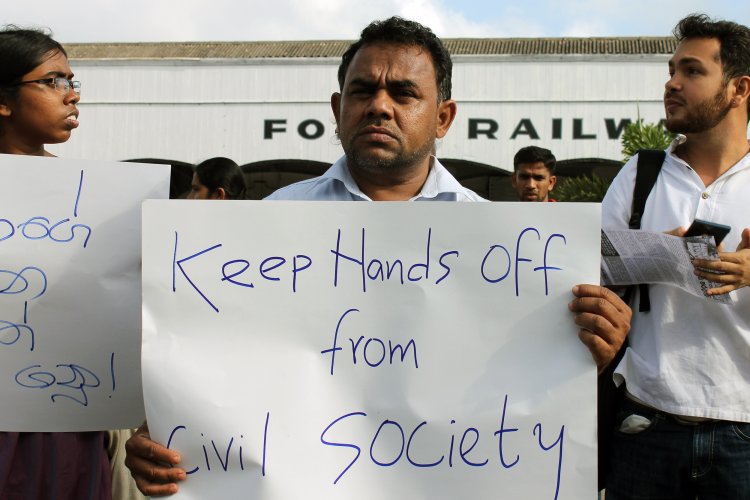Protest for Elections Dispersed by Sri Lankan Police After Electricity Bill Rise

22-02-2023
Héloïse Regnault de Montgon
East & South Asia Human Rights Researcher
Global Human Rights Defence
On February 20, 2023, the Sri Lankan police dispersed a protest demanding elections be held. The opposition protesters who marched in Colombo, the capital, were dispersed with tear gas and water cannons after the elections were postponed indefinitely (Mallawarachi, 2023). Initially scheduled to take place in 2022, the presidential elections were postponed to March 9, 2023 after last year’s economic and political turmoil led the South Asian nation to bankruptcy (Mallawarachi, 2023).
Stating economic reasons, government officials in charge of the election said they had not received money from the treasury needed to hold the elections. The government stated that expenses such as the salaries of civil servants, administrative fees and the installation of polling stations could not be paid for (Mallawarachi, 2023). Opposition lawmakers have accused the government of attempting to further delay the elections. Although an election will not affect the government’s Parliament majority, it is regarded as a test of its public support after it took power following last year’s events (Mallawarachi, 2023). The current government took power after citizens chased out former President Rajapaksa from the presidential palace.
These events are taking place as the Sri Lankan government is negotiating a bail-out package with the International Monetary Fund (IMF) amidst the worst economic crisis since its independence in 1948 (Al Jazeera, 2023). Sri Lanka defaulted on its debt for the first time in its history in May 2022, and has since declared bankruptcy (Al Jazeera, 2022). Attempts to negotiate the bail-out package have led the government to take unpopular measures, such as the recent hike in electricity tariffs. In addition to the shortage of essential items such as food, medicine or fuel, costs have skyrocketed due to inflation (which currently stands at 55%) (Al Jazeera, 2023). The protests are happening in response to the government’s decisions (Mallawarachi, 2023).
The repression of protesters with violent means (tear gas and a water cannon) are a violation of the protesters’ right to express a political opinion and to protest peacefully. These are protected by the International Covenant on Civil and Political Rights (ICCPR), which Sri Lanka ratified in 1980 (UN Treaty Bodies, n.d). Article 19 of the ICCPR states: “Everyone shall have the right to freedom of expression”, which the student exercised by voicing opinions against the regime in place. Article 21 of the ICCPR says: “The right of peaceful assembly shall be recognised” (UN Human Rights, 1976). Sri Lankan authorities violated both of these rights by dispersing protesters who marched on Monday.
Delaying or cancelling elections would also violate Article 25(a)(b) of the ICCPR: “Every citizen shall have the right and the opportunity, without any of the distinctions mentioned in article 2 and without unreasonable restrictions: (a) To take part in the conduct of public affairs, directly or through freely chosen representatives; (b) To vote and to be elected at genuine periodic elections which shall be by universal and equal suffrage and shall be held by secret ballot, guaranteeing the free expression of the will of the electors” (UN Human Rights, 1976). By refusing to hold elections, the government would violate its citizen’s right to take part in public affairs by designating its representatives.
Sources:
Al Jazeera. (2022, November 8). UN warns of worsening food crisis in Sri Lanka amid economic woes. Al Jazeera. https://www.aljazeera.com/news/2022/11/8/un-warns-of-worsening-food-crisis-in-sri-lanka.
Mallawarachi, B. (2023, February 20). Sri Lankan police disperse protesters demanding election. AP News. https://apnews.com/article/politics-sri-lanka-colombo-e989ad0e5615b39bf6f35ae352535a4d.
United Nations. (1976, March 23). International Covenant on Civil and Political Rights. UN Human Rights. https://www.ohchr.org/en/instruments-mechanisms/instruments/international-covenant-civil-and-political-rights.
United Nations. (n.d) Ratification Status for ICCPR - International Covenant on Civil and Political Rights. UN Human Rights Treaty Bodies. https://tbinternet.ohchr.org/_layouts/15/TreatyBodyExternal/Treaty.aspx.
Vikalpa. (2014). IMG_0527/''Keep HANDS OFF from civil society" Protest organised by NGOs, front of Colombo railway station, July 17, 2014[Photograph]. Flickr. https://flic.kr/p/omUKtt.

































